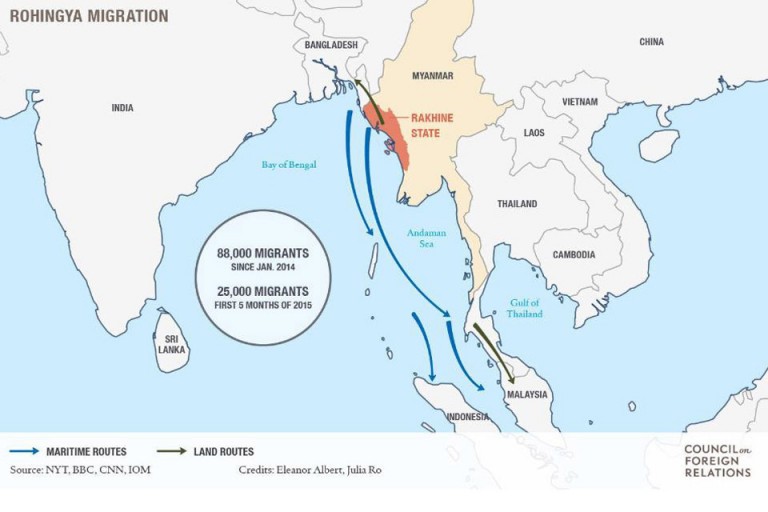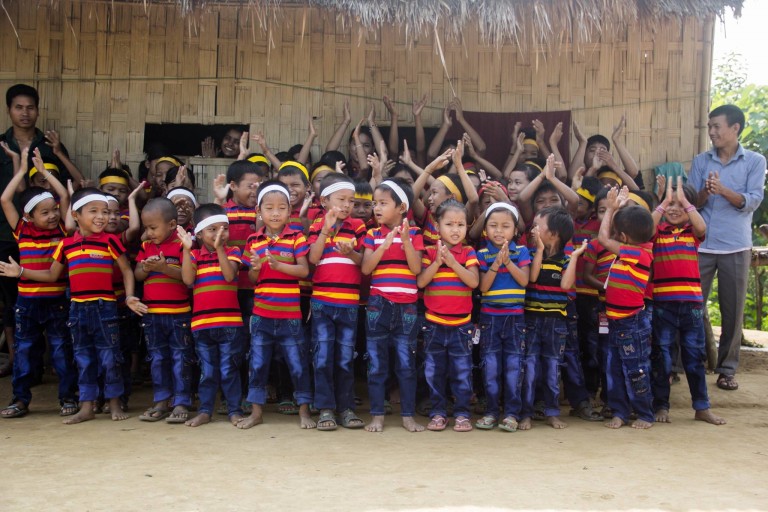Sometimes, you meet some people who inspire you and change the way you see life. Rupa is one of these. We met her through Couchsurfing. She offered us a place to sleep in Hat Yai, and we were supposed to stay one night but we finally ended up staying four days in her home.
Rupa is 34 years old and comes from Chittagong, in Bangladesh. She is so full of energy and joy, but sometimes she becomes quiet and we can see in her look that she did not have a life as easy as ours.
In Hat Yai, Rupa works for the United Nations to help refugees from Myanmar. These refugees are Rohingyas. They are a Muslim ethnic group living in West Myanmar. Myanmar is a Buddhist country and does not recognize them as their citizens, saying they are Bangladeshi. But Bangladesh do not consider them as Bangladeshi because they do not live in their territory. Hence Rohingyas form a stateless community. But it is worst than that. In Myanmar, Rohingyas are marginalized and persecuted, they do not have any right, they cannot vote, open a business, benefit from healthcare. In 2012, a law has been voted to prevent them from getting married to Buddhist Burmeses. At that time, there were riots because Buddhists accused a Royingya for raping a Buddhist girl. So especially after 2012, lots of them have been leaving Myanmar to find a better life in Malaysia. But they fall in the hands of human traffickers, they are crowded in boats, and once they arrive in Thailand, a lot of them end up in immigration detention centres or protection and development centres, surveyed by Thai authorities.

Rohingyas speak Rohingya language which is very similar to the local dialect spoken in Chittagong, Rupa’s home city in Bangladesh, so that is why Rupa can help them because she speaks Rohingya language. Her mission is to make sure Rohingyas are not mistreated in the immigration detention centres, and to facilitate phone calls between them and their families. During phone call facilitation, the refugee gives Rupa the phone number to call to reach someone of their family, then Rupa calls and asks some questions to make sure the person answering in from the family and not a human trafficker, and then she let the refugee speak on the phone. She then records everything that is said. The phone call is ended after three minutes, as limited by Thai authorities (sometimes they allow longer calls). Refugees may not have talked with someone from their family for many years. I let you imagine how short is three minutes when you discover that someone is still alive, that some of their relatives may be dead… For Rupa it is such a good feeling to help these people that are rejected by everyone. She also acts to help them go to the United States to get a work there. The United States are the only country willing to offer shelter to Rohingyas. If Rohingyas manage to be accepted by the United States, they may be able some day to bring their family with them.
Rupa has been doing this job for 4 months. Before, she set up with her friends six schools for children who live in remote areas in Bangladesh (here is the Facebook page of one). And when I say « remote » areas, I talk about places you can reach only after trekking up to 4 days in the jungle.

She loves working with children and she misses them a lot. But she is very happy doing her job in Thailand, she believes that the meaning of a job is more important than anything else. She has changed jobs a lot of time. She studied sociology and had a few jobs before turning herself towards NGOs. The fact that she values the meaning of a job more than anything else lead her once to quit a job on her first day of work! She had been hired by an NGO, but on her first day she realized the NGO was making profit on the foreign volunteers and these profits were not used for the good cause. Even if she was desperately looking for a job, she had the guts to quit the very day, because this job was not in line with her philosophy.
Rupa has found her way in helping people and taking care about them. And working with people who have such terrible stories makes you become wiser about life and its meaning. Rupa does not need things, she is away from the consumerist society, she does not believe in the concept of « civilized » people. She considers rightly that one cannot call some people « uncivilized » because they live remotely and do not have access to education and modern facilities. « Civilized » people may have all of these, but they sometimes act like animals with such inhumanity to others. When they come upon people less technologically developed, they absolutely want to impose them their way of life. We know that colonisation has harmed all the local people (Maori, ethnies in South East Asia, India, American Indians…) but we still carry on trying to impose our way of life to people leaving in remote areas, not seeing that they do not want anything from us. Some of them are happier than we will ever be, they live simple lives, away from our materialistic cultures.
Some people like Rupa may find the key in helping others and reaching a state where they want to live for people and not for « things ». Consumerist society will always make you feel you need more « things » to be happy, but if you take a step back, look around you, maybe you will realize that giving to other makes you feel better than buying for yourself.
You will say that we all already know that being less materialistic and more centered on people is a key to happiness. However our challenge here is to understand this: How do people like Rupa manage to become detached from consumerism society and devote their life to other people? We are still looking for the answer and hope to meet other people like Rupa to understand what they have in common with her.
Today Rupa inspired us for a better meaning in our work, but we still do not know how we could be able to do what she does, because we like our comfort, we like earning money to travel, we dream of a nice apartment in the centre of Lyon. Maybe this trip without our comfort, with only two backpacks, is the beginning of becoming more like her.

Am proud to say that she is my friend 🙂
Don’t know what to say because I know her from teenagers and I know her.m really proud for her. I am her friend.
Bonjour,
Je viens de découvrir votre blog de voyage, et je trouve le trouve très très inspirant. Je rêve de partir et parcourir tout le chemin retour de façon terrestre. Je n’avais jusqu’à maintenant jamais rencontré de personne le faisant et je trouve très inspirant de lire tous vos article et de voir que ce n’est pas fou mais juste un beau rêve/projet.
Et alors cet article c’est la cerise sur le gâteau, en effet, tout le monde sait rationnellement que l’argent ne fait pas le bonheur et qu’il faudrait se détacher de notre vie de consommateur. Et pourtant, comment passer de cette idée à notre mode de vie, c’est une excellente question et ce genre de rencontres sont particulièrement intenses et pleines de remises en questions.
Je vous souhaite une belle route, et j’vais continuer à venir lire la suite de votre voyage, c’est certain ! 🙂
Bonjour Natacha,
Merci beaucoup pour ton message qui nous fait très plaisir et nous motive pour continuer à partager toutes ces aventures et ces rencontres ! Nous te souhaitons de te lancer et réaliser tes rêves !! A bientôt j’espère 🙂